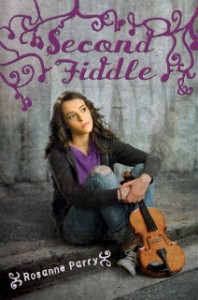By Bob Hicks
“Tuesday, May 22, 1990,” Rosanne Parry heads the first chapter of her newest novel. “West Berlin.”
 Like a lot of writers, Parry just picks her scene and throws you right into the middle of it. Ah. Berlin. Nineteen-Ninety. Scant months after the jubilant tearing-down of the Wall.
Like a lot of writers, Parry just picks her scene and throws you right into the middle of it. Ah. Berlin. Nineteen-Ninety. Scant months after the jubilant tearing-down of the Wall.
Feels like yesterday — except that for the vast majority of Parry’s readers it wasn’t yesterday, it was before they were born, and so it might as well be a tale of the Peloponnesian War: it’s all ancient, and it’s all brand new.
Here’s how Second Fiddle, just out from Random House, begins:
If we had known it would eventually involve the KGB, the French National Police, and the Supreme Allied Commander in Europe, we would have left that body in the river and called the Polizei like any normal German citizen; but we were Americans and addicted to solving other people’s problems, so naturally, we got involved.
Imagine John Le Carré for eight- to twelve-year-olds, although like so many good children’s writers, when it comes to target readership, Portlander Parry pretty much defies neat categorization. Fantasy’s still big in this demographic, but these days kids’ books, which have long dealt metaphorically with adult-sized issues, also have few qualms about lacing adult complexities straight into their stories. In the case of Second Fiddle, that includes the broad and ever-perplexing vistas of international relations. Just how apt a summary of the often contradictory perils and promise of American foreign policy is that last clause in Parry’s opening sentence? Naturally. We got involved. There’s a lot of insight in that surprisingly simple comment.
Parry has a way of getting inside the minds and emotions of kids in a way that reminds you that childhood is a complex moral and intellectual country, often not all that different from adulthood except in experience. In a way, it’s the most fundamental of times, because it’s when you’re figuring out what’s important to you and who you’re going to be. We’ve written here about her first novel, Heart of a Shepherd, which is pretty much about boys. Second Fiddle is about girls — a trio (literally) of girls, all three Army brats with dads stationed in Germany, all three both rash and yet increasingly mature, all three bound by a love for music: they’re a string trio, headed for a high-stakes competition in Paris, when they discover that body in the river. Which turns out to be not quite dead, and to belong to a translator in the Soviet army who’s been dumped there by his own officers, and who is from Estonia, which is in the midst of its astonishing Singing Revolution. And who, if they give him up to the authorities, could end up actually dead instead of taken-for-dead.
That’s pretty exciting stuff, even if, unlike a novel by Le Carré, exploring the murky moral waters of spy-versus-spy is not the story’s primary purpose. Splaying open the soul-corruptions of the quiet skirmishes between cultures is Le Carré’s life’s obsession. Parry uses it as backdrop. But she uses it well. Arvo, the bedraggled-and-almost-drowned soldier, provides an urgent context to the story, and his very existence ups the ante considerably, even when it’s lurking slightly offstage. Jody and her friends, Vivian and Giselle, probably are already more aware of the world beyond than most American kids their age, just because they’re living in Germany in the fading years of the Cold War, and their fathers are deeply involved in it. Once they meet Arvo, geopolitical realities become personal and real — and far more complex than the girls might otherwise have realized.
But this is still mainly the girls’ story, and of the three it’s mainly its narrator Jody’s. In classic youth-fiction fashion, Jody worries deeply about who she is and whether she’s entirely up to the task of dealing with the little daily things, let alone the great big life-changing ones. Finding and rescuing Arvo is one sort of crisis, but it’s only part of a bigger package: how to deal with her family, with her impending move back to the States as her father gets ready to retire from the Army, from her inevitable separation from yet another group of friends, from the fear of not fitting in to the (presumably) more parochial place she’ll be moving to. She’s sure of her passion for music but unsure of her talent for it, and she’s only beginning to realize that, in addition to performing music, she just might become pretty good at composing it. To learn how all of that fits in with an international manhunt and a flamenco family and Pachelbel’s Canon and the legendary expatriate bookstore Shakespeare and Company and the fall of the Berlin Wall, you’ll have to read Second Fiddle yourself. As in all good stories, the world shifts: all sorts of walls come tumbling down.
*
Parry will make a free appearance at 2 p.m. Saturday, April 9, at A Children’s Place Bookstore , 4807 N.E. Fremont St. in Portland. It’ll be a musical afternoon, with a performance by members of the Metropolitan Youth Symphony. Also appearing will be Portland kids’ writer Elizabeth Rusch, whose new book For the Love of Music: The Remarkable Story of Maria Anna Mozart received this glowing review from Helen Babbitt in The Oregonian.